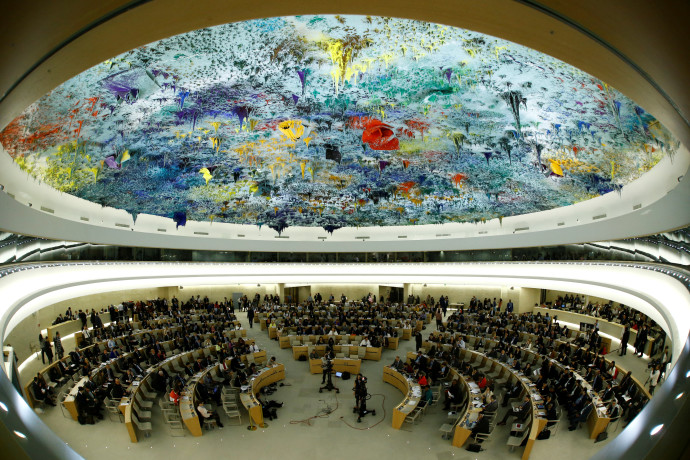
It is good that the United States has returned to the ranks of the United Nations Human Rights Council. This way, the U.S. will be able to see moral corruption from within firsthand, and act to reinvigorate the council and change it for the better.
As we know, the United States has overturned former President Donald Trump’s decision to leave the United Nations Human Rights Council and has returned to its ranks. Trump left the council with much ado, slamming the door behind him, and President Joe Biden returned quietly. Both were correct. Why? Trump left because the council was too focused on harassing Israel. Biden returned hoping to influence it from within and help Israel.
As one who has been present throughout the Human Rights Council discussions, it’s my opinion there can be no revival of the council in its present form. A decade ago, there was an opportunity to reorganize the body, its goals and established practices, but the world lost its chance. The new council, which rose from the ashes of the Human Rights Commission after World War II, was supposed to conduct itself fairly with every country of the world. This didn’t happen because the enemies of Israel were able to maintain the Special Committee to Investigate Israeli Practices Affecting the Human Rights of the Palestinian People, and thus discriminate against Israel.
Even worse, the free world’s opposition to this effort at marginalizing lsrael was weak and unfocused. We could have rid ourselves of the burden, but it didn’t happen. Israel faces a special committee dedicated to regularly issuing anti-Israel decisions, despite the fact that many recognize Israel safeguards human rights more often than most of the countries on the Human Rights Council who regularly stomp on the rights of their citizens.
Trump was convinced that when the U.S. withdrew from the council, it would change its path and become more fair and equal among nations. This did not happen. Now Biden has returned. There is a benefit in the United States’ presence as a member of the council, but its influence is limited. It can act behind the scenes to ameliorate decisions against Israel. It can exert influence among the rest of the members. It will not be able to change the mechanism and the established practices of the council, as it is contaminated from within. As long as members of the council are elected geographically and not based on y any proven record of protecting human rights, the council will continue to be defective, unfair and useless.
It is worth remembering that in contrast to the Security Council, whose decisions are binding on United Nations members, the decisions of the Human Rights Council are not binding. The presence of the United States as a member of the council will help Israel deal with the discrimination and slander. The presence of the United States will demand more fairness. It will demand a discussion of the crude violations of human rights of other countries, among them Iran and Syria.
In order to make the council useful, we have to revisit the way it was composed and the goals it set a decade ago. This would be an enormous undertaking. The U.N. in New York has to decide to do that, and then hold a limited discussion in order to create a council which operates fairly and lives up to its name, an organization that will impartially protect human rights, as its founders intended after World War II. With a new operating structure, Israel will be like all the other nations of the world; and it will not be singled out for discrimination. If there is only one country that can promote and call for a huge project like this, it is the United States. It’s good that the U.S. returned to the Human Rights Council, so it can see the council’s moral corruption firsthand and do something to change it for the better.

Leave a Reply
You must be logged in to post a comment.